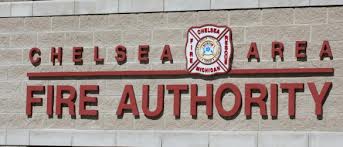
(Publisher’s note: Lyndon Township Supervisor Marc Keezer sent this email on Feb. 21. I have his permission to post it with this story. Very disappointed in your Chelsea update post. My quote was taken out of context and did not include the facts that I was referring to. The insurance rates that most Lyndon Twp. residents pay, are 3 times the rate Chelsea pays in regards to insurance rates for Fire Protection. This is due to an ISO rating of 10, the worst rating according to the information supplied at the ISO informative meeting last week the 15th at the Chelsea Library.)
By Lisa Carolin
Lyndon Township is considering withdrawing from the Chelsea Area Fire Authority.
At the township’s Feb. 15 board meeting, the board voted 4-1 (Maze against) on a motion to give notice to CAFA about the township’s potential intent to withdraw, which requires a one-year notice.
Township officials have been examining the contract with CAFA and trying to decide if it’s the best option.
“We’re paying over three times the amount for fire protection as the city of Chelsea,” said Township Supervisor Marc Keezer.
Trustee John Francis explained the history of CAFA, and why he questions whether the current costs are worth it to the township.
“We’re paying a much higher amount with the millage than we ever did before and don’t think it’s quite as fair as it was,” said Francis.
Keezer said that other options for Lyndon Township would include an unmanned station and a contract with the Dexter Area Fire Department.
Following a public hearing, the board unanimously approved Resolution 17-02, adopting the 2017 Lyndon Township Recreation Master Plan, which is required to be updated every five years.
John Enos, from Carlisle/Wortman Associates, who helped draft the document, told the board, “Lyndon is a blessed community to have this amount of open space. Residents don’t feel a millage is necessary due to the amount of recreation land.”
The board heard from Ben Fineman, leader of the local broadband initiative, who said that the latest estimate is that it would cost township residents 3.15 mils for a broadband initiative, which is lower than the anticipated 3.7 mils.
“If we want to have this on the August ballot, we need to have a resolution at the April board meeting,” Fineman said.
The board gave it’s okay for the Chelsea District Library to pursue a grant for a mobile library vehicle, which would offer computer services as well as a variety of materials to check out. The mobile library could potentially offer two stops in Lyndon Township per week along with an extra monthly stop for special programs.
Regretfully, the board accepted the resignation of Zoning Ordinance Officer Merritt Honbaum, who had been in the job for 17 years.
“I’m going to miss the people,” said Honbaum, who said that he had too many challenges at this time in his life to continue in the job. “I have enjoyed doing it.”
His last day will March 1, and the township is now searching for a zoning ordinance officer.













Interesting. Are any of the documents used to support the proposed withdrawal from CAFA available in the packet or elsewhere? Note: packet not yet available on the Lyndon website as of this writing.
Good job! We cannot make it easy for them to charge us so much more. Our taxes are already too high.
Still waiting for the underlying data. I am particularly interested in information supporting the statement that Lyndon Twp “…pays three times the amount for fire protection as the CIty of Chelsea.” Since Chelsea’s share of the budget is the largest of all four municipalities the statement is clearly false.
Rod Anderson
Supervisor Keezer’s correction to his original statement makes more sense, but is still confusing. Let’s keep in mind that only about a third of the ISO rating is due to the performance of CAFA; the other two thirds are due to the inherent geographic configuration of properties in the municipality, and the ready access to water via piping and hydrants. Lyndon’s poor score is likely due mainly to a failure to provide adequate water access. THe City of Chelsea has of, course, made a significant investment in water plant, piping, and hydrants and is able to achieve a return on investment by reduction in fire insurance rates through the historically good performance of CAFA. Lyndon’s failure to take advantage of CAFA via a sound water program appears to be the main issue here, and has nothing to do with Chelsea.
And of course we should not forget that the life saving aspect of CAFA that we can’t but a dollar amount on.
Rod Anderson